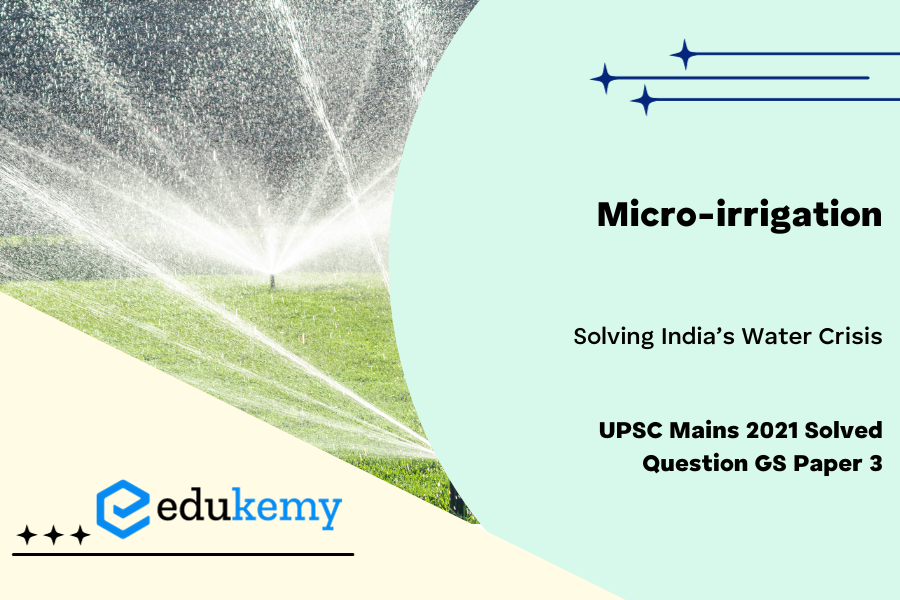Micro-irrigation, such as drip and sprinkler systems, mitigates India’s water crisis by enhancing irrigation efficiency, reducing water wastage, and optimizing crop yields. This technology conserves water, promotes sustainable agriculture, and plays a crucial role in addressing the pressing issue of water scarcity in the country.
UPSC Mains General Studies Paper – 3 Mains 2021
UPSC Mains Civil Services IAS Exam Question Paper – 2021
Contents
Approach
- Start with a brief introduction of the keywords “micro-irrigation technology”.
- Explain the significance of micro-irrigation in solving India’s water crisis.
- Discuss some of the limitations of micro-irrigation.
- Conclusion accordingly.
Answer
Introduction
- Micro-irrigation is a modern irrigation technique that addresses the need for efficient water usage. .It involves the application of water through various emitters such as drippers, sprinklers, and foggers, either on the surface or subsurface of the land. Sprinkler irrigation and drip irrigation are the commonly employed methods of micro-irrigation.Water, a precious natural resource, is in high demand, especially in the agricultural sector. When a nation has an annual water availability below 1,700 kilolitres per person, it is considered water deficient. In the case of India, the per capita water availability stands at an estimated 1,428 kilolitres per year
Body
The significance of micro-irrigation in solving India’s water crisis: Micro-irrigation plays a significant role in agricultural practices due to its numerous advantages and benefits. Here are the key points highlighting the significance of micro-irrigation:
- Water use efficiency: Micro-irrigation ensures efficient water use by directly delivering water to the root zone, minimising losses due to conveyance, run-off, deep percolation, and evaporation. This results in substantial water savings, ranging from 30-50% compared to flood irrigation.
- Energy conservation: Micro-irrigation systems require less water to be pumped, leading to a significant reduction in electricity consumption. The water-efficient nature of micro-irrigation helps in conserving energy resources.
- Nutrient management: Localised water application in micro-irrigation prevents the washing away of fertilisers, reducing nutrient loss or leaching. Additionally, micro-irrigation allows for targeted application of fertilisers (fertigation), preventing weed growth and improving nutrient management.
- Soil erosion control: Micro-irrigation practices help in preventing soil erosion since water is applied directly to the root zone. The absence of surface flooding and run-off reduces soil erosion, preserving the quality of agricultural land.
- Flexibility and cost-effectiveness: Micro-irrigation systems can be employed in irregularly shaped fields and do not require land levelling, making them suitable for a variety of agricultural landscapes. Additionally, once installed, micro-irrigation systems can be less labour-intensive and cost-effective in the long run.
The limitations of Micro-irrigation:
- High initial costs: The expense associated with installing micro-irrigation systems can be a barrier, especially for marginal and small farmers who may find it challenging to bear the initial investment.
- Maintenance costs: Regular maintenance of tubes and sprinklers can be an additional financial burden, particularly for small-scale farmers who may struggle to meet these expenses.
- Susceptibility to sun damage: The lifetime of tubes used in drip irrigation may be shortened by exposure to the sun, leading to wastage and the need for replacements.
- Awareness and adoption: Increasing awareness and promoting higher adoption rates of micro-irrigation, particularly in water-stressed areas, are essential to fully leverage its benefits and overcome challenges.
Conclusion
Hence, Micro-irrigation, with its efficient water use, targeted irrigation, and climate resilience, can play a crucial role in solving India’s water crisis. The future of agriculture lies in precision farming, and micro-irrigation emerges as a crucial stepping stone towards achieving sustainable, profitable, and productive farming practices. By offering precise water delivery and optimising water usage, micro-irrigation plays a pivotal role in revolutionising agriculture.
In case you still have your doubts, contact us on 9811333901.
For UPSC Prelims Resources, Click here
For Daily Updates and Study Material:
Join our Telegram Channel – Edukemy for IAS
- 1. Learn through Videos – here
- 2. Be Exam Ready by Practicing Daily MCQs – here
- 3. Daily Newsletter – Get all your Current Affairs Covered – here
- 4. Mains Answer Writing Practice – here


